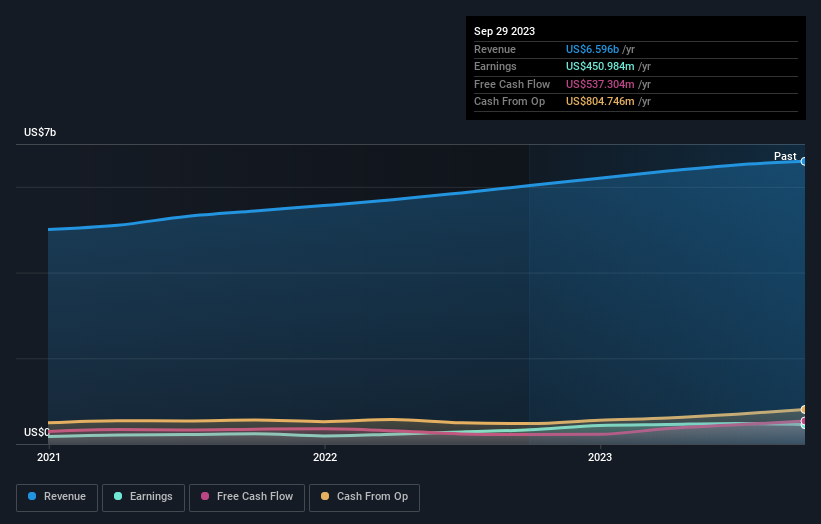Institutional investors are Coca-Cola Consolidated, Inc.'s (NASDAQ:COKE) biggest bettors and were rewarded after last week's US$466m market cap gain
Key Insights
Given the large stake in the stock by institutions, Coca-Cola Consolidated's stock price might be vulnerable to their trading decisions
50% of the business is held by the top 18 shareholders
To get a sense of who is truly in control of Coca-Cola Consolidated, Inc. (NASDAQ:COKE), it is important to understand the ownership structure of the business. We can see that institutions own the lion's share in the company with 41% ownership. That is, the group stands to benefit the most if the stock rises (or lose the most if there is a downturn).
Last week’s 6.2% gain means that institutional investors were on the positive end of the spectrum even as the company has shown strong longer-term trends. The one-year return on investment is currently 73% and last week's gain would have been more than welcomed.
Let's take a closer look to see what the different types of shareholders can tell us about Coca-Cola Consolidated.
See our latest analysis for Coca-Cola Consolidated
What Does The Institutional Ownership Tell Us About Coca-Cola Consolidated?
Many institutions measure their performance against an index that approximates the local market. So they usually pay more attention to companies that are included in major indices.
As you can see, institutional investors have a fair amount of stake in Coca-Cola Consolidated. This suggests some credibility amongst professional investors. But we can't rely on that fact alone since institutions make bad investments sometimes, just like everyone does. If multiple institutions change their view on a stock at the same time, you could see the share price drop fast. It's therefore worth looking at Coca-Cola Consolidated's earnings history below. Of course, the future is what really matters.
We note that hedge funds don't have a meaningful investment in Coca-Cola Consolidated. With a 11% stake, CEO J. Harrison is the largest shareholder. Meanwhile, the second and third largest shareholders, hold 6.4% and 6.2%, of the shares outstanding, respectively.
Looking at the shareholder registry, we can see that 50% of the ownership is controlled by the top 18 shareholders, meaning that no single shareholder has a majority interest in the ownership.
While studying institutional ownership for a company can add value to your research, it is also a good practice to research analyst recommendations to get a deeper understand of a stock's expected performance. As far as we can tell there isn't analyst coverage of the company, so it is probably flying under the radar.
Insider Ownership Of Coca-Cola Consolidated
The definition of company insiders can be subjective and does vary between jurisdictions. Our data reflects individual insiders, capturing board members at the very least. Management ultimately answers to the board. However, it is not uncommon for managers to be executive board members, especially if they are a founder or the CEO.
I generally consider insider ownership to be a good thing. However, on some occasions it makes it more difficult for other shareholders to hold the board accountable for decisions.
Our most recent data indicates that insiders own a reasonable proportion of Coca-Cola Consolidated, Inc.. It is very interesting to see that insiders have a meaningful US$1.9b stake in this US$8.0b business. Most would say this shows a good degree of alignment with shareholders, especially in a company of this size. You can click here to see if those insiders have been buying or selling.
General Public Ownership
The general public-- including retail investors -- own 36% stake in the company, and hence can't easily be ignored. While this size of ownership may not be enough to sway a policy decision in their favour, they can still make a collective impact on company policies.
Next Steps:
While it is well worth considering the different groups that own a company, there are other factors that are even more important. To that end, you should be aware of the 1 warning sign we've spotted with Coca-Cola Consolidated .
Of course this may not be the best stock to buy. Therefore, you may wish to see our free collection of interesting prospects boasting favorable financials.
NB: Figures in this article are calculated using data from the last twelve months, which refer to the 12-month period ending on the last date of the month the financial statement is dated. This may not be consistent with full year annual report figures.
Have feedback on this article? Concerned about the content? Get in touch with us directly. Alternatively, email editorial-team (at) simplywallst.com.
This article by Simply Wall St is general in nature. We provide commentary based on historical data and analyst forecasts only using an unbiased methodology and our articles are not intended to be financial advice. It does not constitute a recommendation to buy or sell any stock, and does not take account of your objectives, or your financial situation. We aim to bring you long-term focused analysis driven by fundamental data. Note that our analysis may not factor in the latest price-sensitive company announcements or qualitative material. Simply Wall St has no position in any stocks mentioned.

 Yahoo Finance
Yahoo Finance 

